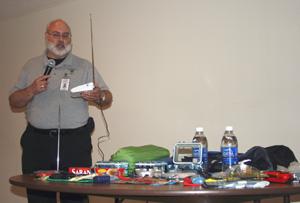
By Anne Marie Amacher
RICHMOND — Prepare, prepare, prepare. That word echoed throughout the day during Diocesan Support Day — Preparing for Disasters.
Around 120 people — pastors, deacons, parish staff and lay members from throughout the diocese — attended the event in Holy Trinity Parish’s Parish Life Center May 28. The Annual Diocesan Appeal funded the event.
Bishop Martin Amos greeted the participants and led them in prayer. Deacon David Montgomery, director of communications for the diocese, led the program.
Participants went over the new Disaster Preparedness and Response Planning Guide for parishes, schools and other Catholic entities and listened to talks about disasters that hit the diocese in the past decade.
Glenn Leach, a volunteer in the diocese’s social action office and the diocese’s liaison for flood recovery efforts, shared what was learned from flooding last year that affected many parts of the diocese. No parish buildings were destroyed and only a few had water in their basements, but flooding affected many parishioners’ homes and lives.
He provided information to parishes for distribution to parishioners on where to seek help. But, parishes didn’t have specific contact people to distribute the information, which meant some who needed it didn’t receive it in a timely manner, if at all, he said.
Leach suggested parishes have a contact person for distributing information about disasters. “Disasters happen and will continue to happen. We want to help you prepare.”
Deacon Montgomery talked about topics addressed in the manual, such as sacramental records. They should be kept in a fireproof safe and a second copy should be stored off site, beside the copy sent annually to the diocese. Back up important information on and off site, in computers, archives or a bank vault for instance, he said.
Preparing for disasters takes time. He suggested parishes start small. Look at what has worked and not worked at other parishes. Form a planning committee of parishioners that includes doctors, contractors and others in addition to parish staff.
Ss. Mary & Mathias Parish in Muscatine has begun that process. Kent Ferris, the diocese’s new director of social action, said when a tornado struck Fruitland and Muscatine in 2007, he was there to help parishioners.
He asked support day participants especially to look at the pages in the planning guide on prayer, volunteerism and assistance. “I went to be with my fellow parishioners. Disasters give no notice. The middle and end can take years to reach.” Being with others is what “the church does best. It shows what community is,” Ferris said.
Sister Cheryl Demmer, PBVM, director of religious education at Ss. Mary & Mathias Parish in Muscatine and St. Joseph Parish in Columbus Junction, shared her experience of the tornado, which happened when she was principal at Bishop Hayes Catholic School in Muscatine. The children knew what to do, she said. “The kids told the parents where to go and what to do. They knew where to go for safety.”
Deacon Jerry Miller shared his experience dealing with the tornado that struck St. Patrick Church on Holy Thursday night in 2006.
He said the sirens were going off throughout Mass “but we didn’t hear them.” It wasn’t until after Mass, when he stepped outside and saw that “bad sky,” that he knew something was going to happen. He saw flashes of lightning and then the tornado. He didn’t know if it was moving toward or away from the church.
He and Father Rudolph Juarez, the pastor, moved everyone into the rectory basement next door to the church. The tornado struck the church and damaged the rectory.
“I spent a lot of time comforting people in the days and weeks after the tornado.”
“The Boy Scouts have it right — ‘be prepared.’”
Deacon Miller said the diocesan manual is a good start. He offered participants tips from the lessons learned by St. Patrick parish in the aftermath of disaster.
Another disaster discussed at the diocesan event was a fire that struck Our Lady of Guadalupe Church in Muscatine in 1997. Terry Eagle was a Muscatine fire fighter who responded to that fire. He wasn’t able to attend the diocesan event, but provided tips for Deacon Montgomery to share with the participants.
Candles initially were the suspected cause of the fire because of their abundant use in the church, including on the floor. But an electric roaster proved to be the culprit. Prevention is the key to avoiding fires. Practice good housekeeping and keep combustible materials away from ignition sources, Deacon Montgomery said. Other tips he shared included making sure aisles aren’t blocked, clutter is picked up and items don’t block sprinklers.
Deacon Montgomery suggested parishes contact their fire department about training on how to use a fire extinguisher and to learn the differences between types of extinguishers.
He addressed handling small fires, calling 911 for help and closing doors when leaving.
Closing doors in churches, schools and other buildings when not in use will help delay the spread of a fire if one occurs.
For more helpful tips on disaster planning read the disaster preparedness guide book, which will be available on the diocesan Web site at www.davenportdiocese.org.
Richard Weber, bookkeeper at Holy Trinity Parish in Keota, thought the fire presentation was great and appreciated the information.
Jenny Thompson, director of religious education at St. Mary Parish in Sigourney, said the seminar made her think about what could happen and the need to prepare. “Many people think ‘It won’t happen to me.’ But it can happen,” she said.
Doris Grilliot, a parishioner at St. Alphonsus Parish in Mount Pleasant who coordinates disaster planning among the parish, hospital and community, thought the presentation was excellent. She noted that St. Alphonsus has an agreement with the hospital and county to provide space for disaster management, which includes using the parish hall for such activities as giving shots during a flu outbreak or other health risk.








